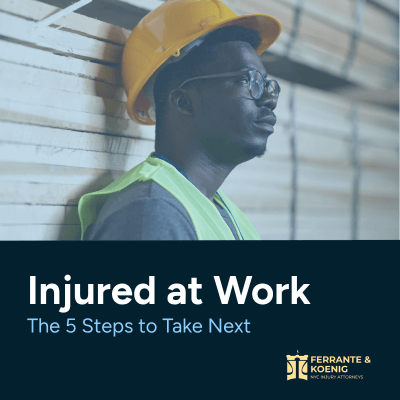If you have suffered an injury while working, you need to take quick action to assert your rights under New York’s workers’ compensation laws.
The workers’ comp system allows injured employees to receive medical treatment and wage replacement benefits paid for by their employers. You do not have to prove employer misconduct to receive benefits, but you must be smart about how you handle your case.
So, what are the best steps to take after you get hurt at work? And what actions should you avoid while handling a workers’ compensation claim? The wisest decision you can make as an injured worker is to hire an experienced attorney.
Anthony A. Ferrante is an award-winning attorney who is a tireless and successful advocate for the injured workers of Brooklyn. Mr. Ferrante has the skills to recover all the benefits you deserve.
Injured at Work? Reach Out to Ferrante & Koenig 24/7 for Qualified Legal Guidance.
What to Do After a Workplace Injury in New York
The workers’ compensation system is helpful to countless employees, but it is also complex. If you want to make the most out of your rights to employer-funded treatment and financial assistance, you should take the following steps:
- Immediately Notify Your Employer
- Provide a Detailed Description of How Your Injury Happened
- Seek Medical Attention as Soon as Possible
- Submit an Official Claim with the State
- Hire an Attorney
Immediately Notify Your Employer
Tell a supervisor or a human resources representative about your injury right away. Employees have up to 30 days to submit written notice of their injury to their employer, but you should make every reasonable effort to give at least oral notice on the day of the injury or as soon as possible. Workers’ compensation insurance companies that provide benefits to injured employees try to find any way to deny coverage, and one of their favorite ways to avoid liability is to claim that a work injury did not happen at work. The longer you wait to report a job-related injury, the more opportunity an insurance company has to claim that your injury occurred outside of work.
Provide a Detailed Description of How Your Injury Happened
While you do not have to prove employer misconduct to receive workers’ compensation benefits, you do have to prove that your injury arose out of and in the course of your work. Keep this in mind when you report your wounds to a supervisor. You need to clearly state what work-related tasks you were performing and where you were when you were harmed. You also need to explain how your injury occurred.
When describing how your injury happened, include what you understand happened to your body or mental state during the workplace incident (leave the rest to healthcare professionals). For instance, if you were a roofer who broke multiple bones after falling off of a roof, you want to give your employer (and treating providers) details about the direction in which you fell, what body parts you landed on, the distance from which you fell, the noises you heard and sensations you felt during and after your fall, and the objects you hit (and where) on your way down.
Seek Medical Attention as Soon as Possible
Your health and the health of your workers’ compensation claim depend on your diligence in seeking treatment. Receiving immediate medical intervention and faithfully following the treatment recommendations of your providers gives you a better chance of a full recovery and can prevent the insurance company from denying liability for your case. If there are gaps in your treatment after a workplace injury, the insurance company can use those gaps to argue that changes in your symptoms are not work-related. And when seeking medical care, remember that your employer generally cannot direct you to use a particular provider.
Submit an Official Claim with the State
If you cannot work for more than seven days or suffer permanent impairment after your work injury, you are entitled to wage benefits. And regardless of how much work you miss because of your injury, your employer should pay for your medical care. To help ensure that you receive all the benefits you deserve, you need to file an Employee Claim (Form C-3) with the state’s Workers’ Compensation Board within two years of your injury. You must be careful about how you answer all questions asked on Form C-3, so it’s best to enlist the help of an attorney when completing the form.
Hire an Attorney
Successfully resolving a workers’ compensation claim is no easy task, made harder by the fact that you need time to recuperate from a workplace injury. This is why you need to talk to a skilled attorney like Ferrante & Koenig right away. We can expertly handle the following while you do the important work of rehabilitation:
- Argue for the highest wage rate for your wage replacement benefits,
- Timely file claims for compensation,
- Help ensure that you see the best providers for your healthcare needs, and
- Prevent the insurance company from denying your claim.
Our approach to resolving claims is not one size fits all. Depending on your needs, we can litigate or settle your claim and maximize your recovery of benefits.
Related: Workers’ Compensation Settlements in NY
What Not to Do After a Workplace Injury
There are many ways to hurt your own workers’ compensation claim. Take a look at the following common mistakes injured workers make that hurt their opportunities to recover compensation and adequate care:
- Taking too long to notify an employer,
- Not following up with a healthcare provider,
- Failing to timely file a legal claim,
- Neglecting to follow any treatment recommendations of a healthcare provider,
- Not speaking to an attorney right away, and
- Failing to follow restrictions given by a healthcare provider.
You have to remember that your employer and its insurance carrier could be watching you closely (even when you are not at work) to find ways to deny your claim. So, you want to make sure you seek legal and medical help and keep up with every healthcare recommendation in your case.
Special Considerations for Construction Workers
The injury risks you face as a construction worker are high. And addressing those injuries in the workers’ compensation system can be challenging.
Seeking care and support through workers’ compensation can be more difficult in the construction industry because benefits apply only to employees and not independent contractors. Fortunately, New York’s Construction Industry Fair Play Act presumes that construction workers are contractors’ employees as long as they do not meet certain criteria under a two-part independent contractor test. Speak to your attorney about whether this test applies to you.
Related: How Much Is My New York Construction Site Accident Case Worth?
Hire a Top-Rated Attorney Today
When facing the aftermath of a work injury, you should have the best advocate available. Give our firm a call at 646-450-4110 or contact us online to schedule a free consultation.


















